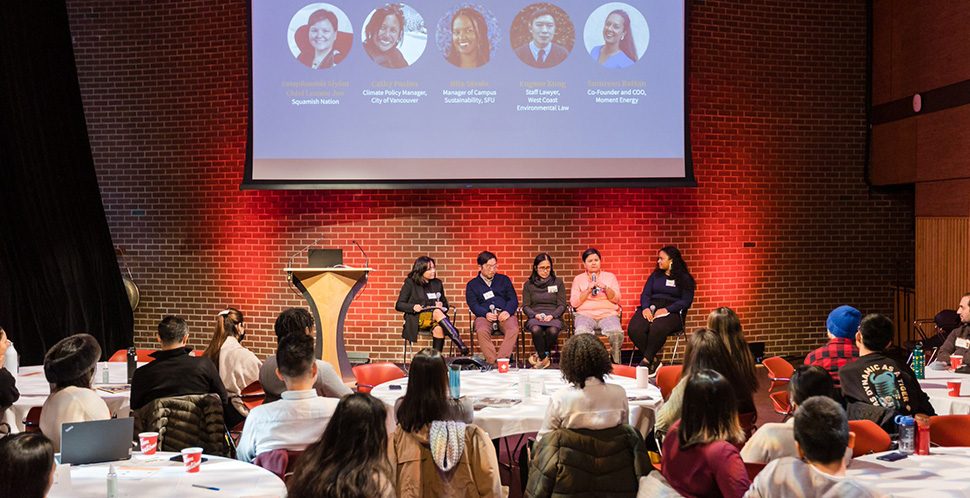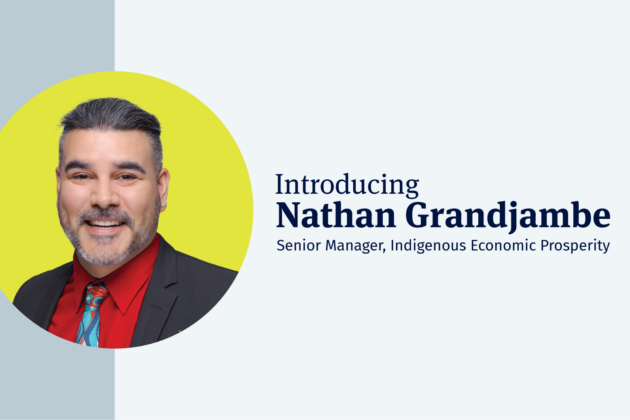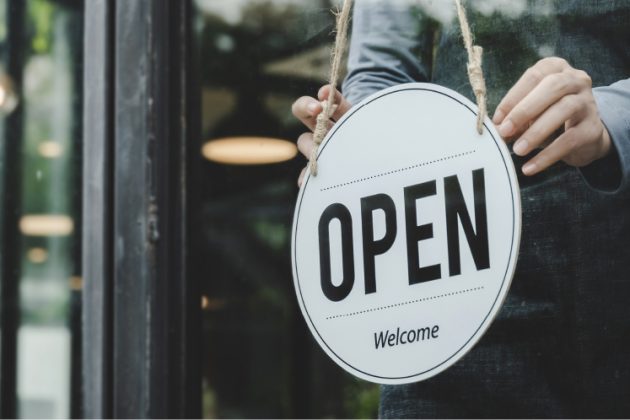Equity-seeking communities invaluable to building a climate-just workforce
In November 2022, the Vancouver Economic Commission (VEC) teamed up with Rita Steele, founder of the BIPOC Sustainability Collective, to hear from IBPOC sustainability professionals on how employers and employees in Vancouver can build an inclusive and climate-just workforce in 2023. This work comes out of the Zero Emissions Economic Transition Action Plan (ZEETAP), which identified that VEC should “work with local justice, equity, diversity, and inclusion practitioners to increase diversity in the sustainability industry”; and to take broader action on the just transition for workers across the economy.
In 2021, the BIPOC Sustainability Collective was launched to support BIPOC sustainability and climate change professionals and activists around Metro Vancouver. We started meeting with VEC because our teams shared similar goals to diversify the sector and support the BIPOC leaders who face barriers within it. Through our budding partnership, VEC offered official support to help scale up the potential of our community in their Zero Emissions Economic Transition Plan (ZEETAP), and we have now surpassed 150 members!
It was such a meaningful process planning this kickoff event together. Bringing together professionals from differing backgrounds and experience levels, we all still found that we faced similar challenges and barriers to growth in the sustainability sector. Hearing from several participants that they left the event feeling warm, connected and energized left a special impact as well. We plan for this to be the first of many initiatives we take on to drive support for BIPOC working in sustainability and climate change.
-Rita Steele, co-founder, BIPOC sustainability collective
In this recap:
- The forgotten “S” in ESG
- Context: We must engage equity-seeking communities while co-designing a climate-just workforce
- Outcomes: scaling the BIPOC sustainability network
- Takeaways: 3 barriers to IBPOC professionals thriving in sustainability workplaces
- Takeaways: 6 potential solutions to support IBPOC coworkers in sustainability workplaces
Accelerating the ‘S’ in ESG
CPA Canada has observed a surge in businesses adopting ESG principles (environmental, social, and governance) in recent times. The environmental element has achieved particularly strong growth, especially as governments and consumers become increasingly aware of climate change. According to Deloitte, 70% of businesses surveyed understand the need to make meaningful changes through incorporating more sustainable materials or increasing the efficiency of energy use. Meanwhile, S&P Global recommends that businesses ask themselves some hard questions: “can they manage their relationship with their workforce, the societies in which they operate, and the political environment?”
Despite various efforts to diversify the sustainability sector, progress has been slow. In Vancouver, Indigenous, Black and People of Colour (IBPOC*, alternatively styled BIPOC) sustainability professionals frequently find themselves the lone people of colour in their organization, in climate change conversations, or networks. As the region collectively moves forward with climate action, questions related to workforce development are critical – environmental, social and governance considerations are driving work in this area for many businesses.
Moreover, as we grapple with workforce gaps across every sector, it is critical that we address diversity and inclusion; sustainability professions are a key career area to address for both equity and climate reasons.
Event takeaways and outcomes
As an outcome of the workshop, the Vancouver Economic Commission is supporting the BIPOC Sustainability Collective in solidifying its community in Vancouver. Organizers will incorporate the feedback and information from the event to guide the future direction and actions of the Collective. If you identify as IBPOC, and are working in the sustainability sector in Metro Vancouver, follow BIPOC Sustainability Collective’s Facebook page and join the group to stay apprised of future events.
Achieving an inclusive and climate-just workforce requires addressing the barriers that IBPOC sustainability professionals often face in the workplace. Attendees of the workshop and networking event shared some of what they felt to be the greatest barriers – and opportunities – to IBPOC professionals thriving in sustainability workplaces.
Editors’ note: As IBPOC professionals at VEC, we felt it important to ensure the 40+ IBPOC voices who shared their experiences at the event at which we received these learnings were also represented by IBPOC writers and editors.
– Khayla Almonte-Davila, Vanessa Sun, Ingrid Valou
Takeaways: 3 barriers to IBPOC professionals thriving in sustainability workplaces
1. Accessing inclusive networking spaces identified as one of the largest barriers for IBPOC sustainability professionals
Event attendees reported feeling unwelcome or intimidated by networking in climate spaces when there are few other IBPOC attendees or professionals in the room. Many active networks for sustainability are perceived to be highly siloed and exclusive, on the basis of “whiteness” (i.e. class, education, and other exclusionary factors).
During the event, BIPOC professionals expressed the need or tendency to code-switch in order to adapt or fit in, to take on characteristics they associate with whiteness – that of a certain class, manner of speech, education and dress. Attendees also reported that gatekeeping practices – such as the curation of event or network attendee lists, and the perceived requirements to be literate and comfortable with academic terms – can create additional barriers.
Higher education is key to networking in the sustainability field; however, it comes at a high cost. Of those surveyed by Diversity in Sustainability in their State of Equity, Diversity and Inclusion in Sustainability report, 62% had a Master’s degree or higher, 28% had a Bachelor’s degree, and 13% had a professional designation in addition to an advanced degree.
According to Statistics Canada, the average tuition for a graduate student in British Columbia is $9,994, which is up to 34.4% higher than the national average. For international students, costs are even higher, as their tuition also includes international fees and additional cost-of-living fees.
2. There’s a long way to go for equitable recruitment practices and workplace readiness.
The rising awareness and significance of workplace equity, diversity and inclusion has cultivated hiring practices to achieve diversity quotas. When a company has not done the practical work to set these hires up for success, however, it can create feelings of isolation, tokenization and exclusion for IBPOC employees within a shifting company culture.
Attending sustainability professionals reported incidents where they were stereotyped or tokenized, which some agree led to their feeling “pigeonholed” into adjacent equity-leaning roles. When put in these positions, some attendees commented on feeling required to be the expert in all things JEDI (justice, equity, diversity, inclusion), with the added pressure to champion those practices in the workplace.
These feelings of exclusion and pressure are compounded when the sustainability field is perceived to have an implicit demographic bias, with white candidates outnumbering Indigenous and people of the global majority applying for the same position. As a result, some attendees expressed the need to over- or out-perform job qualifications in order to shed the perception by colleagues of being a diversity hire; others received feedback from recruiters for being overqualified for positions.
Newcomer IBPOC applicants and jobseekers face additional hiring challenges, such as an employer preference for local experiences, unrecognized credentials and degrees, and language barriers in which the comprehension bar for sustainability language is “too high to participate” in conversations.
“It takes years to realize that it wasn’t you feeling under-confident, but [but that it’s] because of how there is not enough representation” – Workshop participant”
3. Increased adversity with minimal mental health support
Following hiring barriers, some attendees expressed increased duress when working in the sustainability space because of the need to navigate occasional or endemic toxicity by colleagues (e.g. systemic racism, cultural misunderstandings and microaggressions).
There are also pressures related to code-switching, burnout from speaking about inequities in sustainability, and a higher likelihood of carrying the burden of intergenerational trauma. (e.g. parents being residential school survivors, challenges from being an immigrant or refugee family).
The ability to feel comfortable and secure in workplaces is therefore a critical factor in the success of IBPOC careers. However, attendees report that adequately supportive ones are rare; of these, some have shared stories of employers struggling to satisfactorily support or handle any friction or duress arising from systemically rooted practices.
Mental health and HR supports are an increasing phenomenon in the workplace, but some event attendees report that what supports exist fall short of the kinds of adversity specific they have experienced.
Takeaways: 6 steps employers and colleagues can take to support IBPOC sustainability professionals
1. Create a safe space in the workplace
A safe workspace comes from an organization that centres the holistic wellbeing of its IBPOC workers. One suggestion was to introduce a provision or resource for mental health supports – ideally in the language most comfortable to the worker. Another is to demonstrate compassion when workers request time off or leave, and being aware that IBPOC workers feel the need to code-switch (usually adjusting speech, appearance, behavior, and expression in a way beyond what is typically expected of white counterparts).
2. Audit the recruitment process
A safe workspace can be furthered by auditing the recruitment process of the organization. Audits should ensure recruiters are not simply looking to meet a diversity quota, and that they truly value an equitable workplace comprised of people of diverse backgrounds.
Questions that should be asked:
- Is the organization ready for IBPOC candidates to be safer and valued for their experiences? What has the organization done so far?
- Are there IBPOC on the recruitment panel?
- What barriers still exist in the recruitment process that would make the role inaccessible for IBPOC to apply?
3. Don’t assume what IBPOC professionals need
A general best practice is to avoid making assumptions or prescribing solutions for IBPOC workers. As colleagues, simply being available and compassionate can provide the uplift needed.
4. Create opportunities for peer support
Peer support, specifically IBPOC peer support, can provide opportunities for connective one-on-one mentorship. This can elevate opportunities for IBPOC workers to be heard in the workplace and engage in soft skills building, which are opportunities these workers might not have been offered in the past.
5. Create a space to learn from IBPOC experiences and perspectives
IBPOC professionals have different lived experiences and cultural contexts that can provide alternate and complementary solutions to the climate crisis. However, they may be ignored for the dominante western and North American perspectives on climate change science. An example is the lived experiences with “zero waste” practices that have been a part of many IBPOC lives, particularly those of newcomers.
6. Be flexible about resources and training opportunities for IBPOC professionals
Along with different lived experiences, some IBPOC have different training and credentials. Be flexible with requirements (for instance, not everyone has a driver’s license) and provide training opportunities if needed.
The role of the Vancouver Economic Commission
The Vancouver Economic Commission’s Zero Emission Economic Transition Action Plan (ZEETAP) calls for the VEC to work with local justice, equity, diversity, and inclusion practitioners to increase diversity in the sustainability industry. To achieve this action, the VEC partnered with Rita Steele, founder of the BIPOC Sustainability Collective in Vancouver.
Other resources to take note of:
- Diversity in Sustainability
- City of Vancouver, Climate and Equity Working Group
- SFU’s Vancity Office of Community Engagement
- Vancouver Economic Commission: Tech Bootcamps to remove hiring barriers for newcomers



